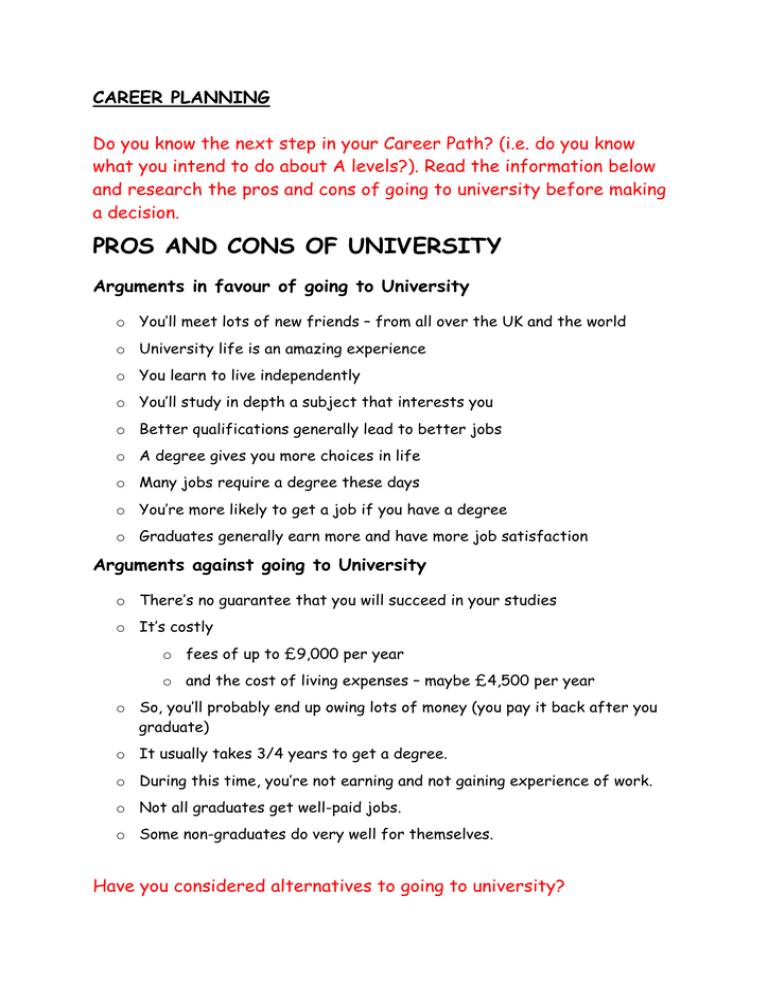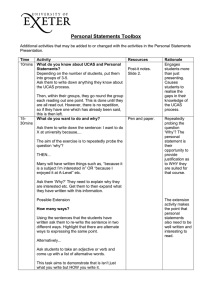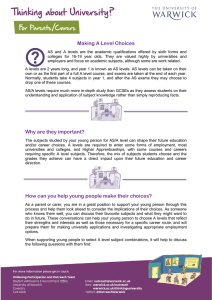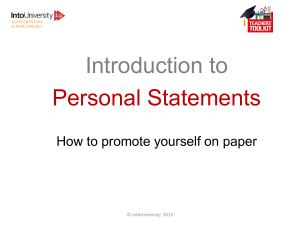pros and cons of university
advertisement

CAREER PLANNING Do you know the next step in your Career Path? (i.e. do you know what you intend to do about A levels?). Read the information below and research the pros and cons of going to university before making a decision. PROS AND CONS OF UNIVERSITY Arguments in favour of going to University o You’ll meet lots of new friends – from all over the UK and the world o University life is an amazing experience o You learn to live independently o You’ll study in depth a subject that interests you o Better qualifications generally lead to better jobs o A degree gives you more choices in life o Many jobs require a degree these days o You’re more likely to get a job if you have a degree o Graduates generally earn more and have more job satisfaction Arguments against going to University o There’s no guarantee that you will succeed in your studies o It’s costly o fees of up to £9,000 per year o and the cost of living expenses – maybe £4,500 per year o So, you’ll probably end up owing lots of money (you pay it back after you graduate) o It usually takes 3/4 years to get a degree. o During this time, you’re not earning and not gaining experience of work. o Not all graduates get well-paid jobs. o Some non-graduates do very well for themselves. Have you considered alternatives to going to university? * College of Further and Higher Education * Employment * Vocational Training * A gap year You need to research these options and make an informed decision about the next step on your Career Path. Have you considered what and where you want to study? DECIDING ON A COURSE Decision Details Use one of the following websites to help you find the right course for you: www.coursefinder.com; www.ucas.com (Stamford test) and thinks about these things:Academic or vocational? Some courses are aimed directly at a particular type of employment field (vocational). Others are more general. Cost and quality of accommodation varies a lot. Your choices include: • Hall – student accommodation. Not always on the same site as the university. Can be fully catered (all meals provided – expensive), part-catered (you have to do some meals for yourself), selfcatering (you do your own meals usually in a shared kitchen), ensuite (expensive but you have your won bathroom facilities), shared or single (two students in one room or a room of your own), single sex or mixed sex (the Halls have men only, women only or a mixture) • Student house (shared with others). Self-catered. Sometimes arranged through the university; sometimes through an agency. • Home – much cheaper. Only practicable if you study near to your home. Miss out on full experience. Accommodation Art & Design Two possible admission routes – A and B. Our students mostly use route A which is the same process as other subjects. If your teachers think Route B is appropriate, seek further advice from the Year Office. Route B course codes start with the letter E. Assessment Do you prefer a course with lots of exams or one with lots of coursework and practical assessment? Decision Details Bursaries Some universities are offering more generous financial packages than others. Check this out. Campus or not? Many rural universities are campus-based with most of the university facilities on one site. More intimate, easy to make friends. But can be isolated and claustrophobic. Transport costs can be a problem. Choice Some courses offer a wide variety of optional modules. With others there’s less choice. City or rural? Cities are lively, vibrant and exciting but they can also be expensive, crowded and polluted. Class sizes This varies enormously. Some classes / tutorial groups are very small; others are much larger. Cost of living Different places cost different amounts. Course content Read the course details carefully. Courses with the same name can cover very different work at different universities. Beware! Read the University Prospectus carefully and look at the ‘About this course’ section of the Course Entry Profiles on the UCAS website. Course structure Do you prefer a modular approach (units of work lasting several months) or a linear approach? Pros and cons in both. What suits you best? Decide from the following: Foundation Course – often required for Art courses. Not a Higher Education Course so no student loans but you can apply for a Further Education bursary. Course type Foundation Year - Even with good A Levels you might not have what it takes to start a particular course right away. So, some courses offer a Foundation Year – eg some Art, Engineering and Medicine courses. HND - If you’re unlikely to get the qualifications you need for a degree (2 A Levels minimum) or if you prefer a shorter more vocational course, you could do an HND (you must have studied 2 A levels or equivalent but need to pass only 1 A level) Degree – minimum three years of study. Minimum of 2 A Levels or equivalent needed. Vocational or academic choice. Deferred entry Some students will apply in 2009/10 for a start in 2011. This is called deferred entry. Make sure that the courses you are applying for accept deferred entries – don’t just assume they will. If you are deferring, do not apply for funding until the following year. Decision Details England, Northern Ireland, Scotland or Wales Fees are different in Scotland, Wales and England, to those in N. Ireland. N.I. where most courses charge £3,000 per year, the others are around £9000. Remember many Scottish courses last a year longer than English ones. Entry requirements Check these very carefully. Are you doing subjects that the university will accept for your chosen course? Will you get the right grades / UCAS points for the course you’re interested in. Have you studied enough units? It’s vital to know what grades you’re likely to get and choose courses that are relevant to these grades. If in any doubt, check the with course Admissions Tutor at the university. Refer to the UCAS Tariff page later in this booklet and ask for advice from your careers teacher. Foundation Degree Foundation degree – may be offered if you haven’t met grades for degree course. You need to find a maximum of 5 courses but: How many choices? • You have only four choices for medicine, dentistry, veterinary (the remaining 1 can be for any other course); • you can only apply to Oxford OR Cambridge (not both) in any one year • You can only have 3 Route B Art & Design courses. Live at home? It’s not easy when you live here but some students study at Magee or travel to Coleraine on a daily basis. Much cheaper than living away from home but you miss out on some of the experiences of ‘real’ student life. Location Near home or far from home. Benefits in both! Perhaps best to strike a happy medium by choosing somewhere not too near and not too far. High transport costs if you’re a long way away. Nursing You can apply for a Nursing degree (through UCAS) or a Nursing Diploma (through NMAS). You apply for funding as usual and they ask the NHS to send you the forms in June. Open Days Do find the time and money to attend Open Days for the places you intend to apply to. It’s the only way to get a proper ‘feel’ for a place – and you will be living there for three years or more so it’s important to get it right. Check www.ucas.com for dates. See www.opendays.com Popularity of course Popular courses can demand higher entry grades. If you’re applying for an over-subscribed course, apply early, be realistic about your grades, have relevant work experience, make your personal statement stand out and have a back up. Decision Details Professional Some courses offer professional qualifications as part of the course – eg QTS (Qualified teacher Status) qualifications Quality of course How do you know that the course you’re applying for has a good reputation? It’s difficult to know for sure! However, you can look at books such as Heaps’ Degree Course Offers, The Guardian University Guide, The Times Good University Guide, Hotcourses Guide, Art & Design Directory. There are also some websites to help: www.tqi.ac.uk, www.educationguardian.co.uk/universityguide2009, http://www.timesonline.co.uk/tol/life_and_style/education/good_univers ity_guide/www.educationguardian.co.uk/universityguide2009www.hesa.ac. uk, www.qaa.ac.uk/reviews Universities asking for the highest grades are not always the best. Sandwich course or not? Some courses have periods in industry as part of the course. This means they last for an extra year. Real benefits in getting practical experience and, maybe, a job for the future. Small or large Would a small university where things are a bit more personal suit you better than a large university where you can be anonymous? Fewer facilities at a small one though. Social life If this is important to you, check out how active the social scene is at the university. The Students Union often provides a wide range of social opportunities. City-based universities have a lively social scene. Study facilities These are far better in some places than others. Check out library facilities, computer access etc. What to study There are over 50,000 courses to choose from! Do your research and find a subject that interests and excites you. Do Coursefinder or try the Stamford Test (at www.ucas.com) to help. Also look at the Search section of www.ucas.com, www.aimhigher.com, www.coursediscoveronline.com, www.hotcourses,com, www.ukcoursefinder.com, What’s right for you Weigh up all the factors above and you’ll eventually come up with the right course for you Withdrawing Once you’ve accepted an offer (either Firm or Insurance), you can only withdraw from the course to accept a course somewhere else if the university you accepted ‘releases’ you. Otherwise, you can withdraw completely and re-apply the next year if you wish. If you wish to withdraw your application from one or more courses before they’ve made their decisions about offering you a place, you need to contact the admissions tutor at the university(ies) and they will let UCAS know. THE FOLLOWING INFORMATION WILL HELP YOU RESEARCHING COURESE. www.ucas.com 1. Go to the UCAS Home Page. Click on Course Search 2. There are three ways to search which are explained on the screen. On the first way of searching, you enter the subject(s) that interest you; in course type you enter Degree and Full-time; you can choose to search in all institutions or select one; you can choose to search in one or more regions; and, finally, you can ask for specific requests such as Route B (Art& Design), courses leading to Qualified Teacher Status, courses leading to other professional qualifications. 3. Then click Search. The results are listed by university and you can click on any course to see more details. On the course page, you can look at entry requirements and click on the English (etc) button. www.hotcourses.com 1. It’s a similar system to UCAS but here they refer to the kind of courses most of our students are looking for as First degrees or Undergraduate courses. 2. Once again, you select the level (First degree), the location, the subject, the study mode (full-time), the location (the choice is anywhere in the UK), England only or London). 3. The courses are then listed for you with links to further information. 4. There’s lots more information on the Hotcourses website related to funding and other issues. www.ukcoursefinder.com 1. Similar methods used here for searching for courses. www.aimhigher.ac.uk 1. Click on the courses tab for information about choosing courses, course search, open days, ordering prospectuses and frequently asked questions. 2. It then provides links to the other search websites referred to above. www.learndirect-advice.co.uk This allows you to search for all levels of courses – not just degrees. What is a ‘good’ university 1. This is not straightforward however, universities are measured in various ways and there are websites to help you assess teaching quality, the research they do, how well their students do and how many get jobs at the end of it. www.educationguardian.co.uk/universityguide2009 (this contains up to date information) http://www.timesonline.co.uk/tol/life_and_style/education/good_ university_guide/ www.tqi.ac.uk http://www.studential.com/ http://www.uwic.ac.uk/new/about_UWIC/coming_to_you/insiders _guide.asp http://www.unistats.com Also look at books such as Heaps Degree Course Offers, The Guardian University Guide, The Times Good University Guide, Hotcourses Guide, Art & Design Directory.





